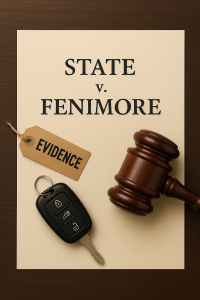 The New Jersey Supreme Court has continued to reinforce the strength of our State Constitution’s warrant protections in its recent decision, State v. Fenimore. The Court unanimously held that the automobile exception does not permit police to conduct a warrantless search of a vehicle once law enforcement has full control over the car, its occupants, and the surrounding environment. In Fenimore, the defendant had been arrested for DWI inside a State Police barracks, the passenger had been removed, officers had possession of the keys, and the vehicle was required to be held for a mandatory twelve-hour impound period under John’s Law. Despite these circumstances, where mobility, safety concerns, and the risk of evidence destruction were completely neutralized, the State Police searched the car in the station parking lot without obtaining a warrant.
The New Jersey Supreme Court has continued to reinforce the strength of our State Constitution’s warrant protections in its recent decision, State v. Fenimore. The Court unanimously held that the automobile exception does not permit police to conduct a warrantless search of a vehicle once law enforcement has full control over the car, its occupants, and the surrounding environment. In Fenimore, the defendant had been arrested for DWI inside a State Police barracks, the passenger had been removed, officers had possession of the keys, and the vehicle was required to be held for a mandatory twelve-hour impound period under John’s Law. Despite these circumstances, where mobility, safety concerns, and the risk of evidence destruction were completely neutralized, the State Police searched the car in the station parking lot without obtaining a warrant.
At the suppression hearing, a crucial detail emerged: because this was a DWI arrest, John’s Law required that the car be impounded for at least twelve hours, and the trooper openly admitted the vehicle was not going anywhere. That admission gutted the State’s claim that this was the kind of mobile, rapidly unfolding situation that justifies the automobile exception. The State tried to save the search by pointing to hypothetical risks of third-party tampering and by characterizing the barracks parking lot as effectively still “on scene,” but the Supreme Court rejected the idea that speculative fears can create exigency where police already have full control over the car, its occupants, and the keys.
Relying on State v. Witt, the Court reiterated that New Jersey’s automobile exception is intentionally narrow and applies only to true on-scene situations involving spontaneous probable cause and real-time exigency. The search in Fenimore occurred in a controlled environment where any urgency had been neutralized: the driver was in custody, the passenger removed, the keys seized, and the car subject to mandatory impound. Under those facts, the Court held that the police were constitutionally required to seek judicial approval before searching. With no valid exception to the warrant requirement, the search violated the New Jersey Constitution, and the Court ordered suppression of the evidence.
 Hudson County Criminal Lawyer Blog
Hudson County Criminal Lawyer Blog

